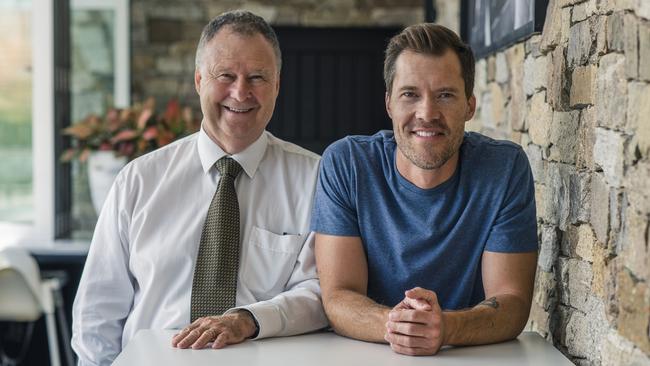Divorce? There’s now an app for that
Cheaper, quicker, and you don’t even have to be in the same room. A Brisbane dad-son duo have come up with a world-first, AI-enhanced solution to messy marriage-ending mayhem.

North
Don't miss out on the headlines from North. Followed categories will be added to My News.
Digital disruption has hit the legal minefield that is divorce, with a Brisbane dad-son duo coming up with a clever, world-first AI-enhanced solution to messy marriage-ending mayhem.
Adieu.ai promises to help people “divorce more collaboratively, fairly and affordably in time frames that have never been possible before”, using a “consensus accelerator” agreement program, coupled with input from real-life lawyers and support from a trained mediator, and an artificial intelligence bot called Lumi. And it’s promised to be much cheaper.
MORE:
Jump on-board the $6 billion jobs boom
How to tell your kids you are separating
‘We put our marriage through the divorce predictor equation and wow’
$1 FOR 28 DAYS: SUBSCRIBE TO CITY NORTH NEWS & THE COURIER MAIL
It’s the creation of Bill Wight, from Coochiemudlo Island, and his son Andrew, from Balmoral, who wanted to cut down on the expense and emotional trauma of divorce.
And while the explanation might seems as complex as a traditional divorce can be, the Wights say their trials have cut down that fraught final agreement sign-off time to under 20 minutes.
“Yep, 19 minutes,” Bill said. “It allows people to come up with financial and parenting agreements which are legally sound and sanctioned by court in a shorter time frame than traditional divorce. The average time it take to make a financial settlement (traditionally) is between one and three years. In our trials, (after the consensus accelerator process) the average was 19 minutes.

“Our whole process is four to six weeks compared to one to three years in total (the traditional way), from beginning to end. And the actual time where they come to an agreement — ours is 20 minutes and the traditional one is four to eight hours.
“I’ve been to traditional settlements. It’s like a war day. It’s so fatiguing.”
It the new way costs just $5000, Bill says, a far cry from the estimated $20,000-$40,000 cost of a traditional legal uncoupling. (The $900 government fee for an application for divorce is not included.)
They reject any suggestion their program offers a shortcut to divorce, therefore devaluing the institution of marriage. They say they don’t want to get rid of lawyers. And there’s no nasty divorce story lurking in either man’s past, either, they say. Bill has been married for 40 years and Andrew is coming up to 20 years.
What do you think? Comment below or find us on Facebook @QuestNewspapers.
“I am an accountant and I have been involved in helping lawyers and clients going to court, and what I saw in that time was appalling,” Bill said. “It’s just a terrible waste of money and time and stress, and it puts people through much more pain than is ever needed.
“We have been looking for a better way for about three years, and this is what we have come up with. This is technology to help people once they have made the decision to separate. We are not trying to make divorce easy. This is for when the decision has been made — it gets the kids out of uncertainty as fast as possible.
“This is not about eliminating lawyers, we are about eliminating adversarial process, to give more people access to lawyers and justice in a measure way, a more accessible way.”
Andrew says it’s about social justice, too.
More on divorce:
What is ‘bird-nesting’ and why is every divorced couple doing it?
Posh breaks silence on divorce rumours
How divorce created the darkest Indiana Jones movie
$1 FOR 28 DAYS: SUBSCRIBE TO CITY NORTH NEWS & THE COURIER MAIL
“Because of the cost, a lot of people don’t formalise their divorce, so they are in a holding pattern,” he said.
“They go their separate ways and see what happens.
But what happens in many cases, though, is that on party is left at a disadvantage. The couple will agree to go 50-50 with everything that is in joint names and then take everything that is in their own name. If feels fair, but after they agree to that, one person — in many cases the woman — ends up with the majority of care for the kids and because of that they have a diminished earning capacity, and they have a lower superannuation balance because they took time off work to have those kids.
“One party ends up living in poverty because the provision of legal advice during a divorce is not accessible to them. They don’t know they should get more assets because they look after the kids, nor that they should get access to their partner’s super.

“There is a review of the Family Court going on now, with a report due in April, but our view is that fixing this court system is not going to fix this injustice, because most people don’t go through the courts to get divorced.
“About 71 per cent of Australians do it outside of court, with no access to legal advice.”
The company recently won an National Government’s Accelerating Commercialisation grant of more than $350,000, which they are using to launch their product to a wider market.
“We’re currently organising a trial with finance brokers, who are often the first port of call for those going through separation,” said Bill, who is also a financial adviser who has consulted on many divorces. “This means that people who are going through separation and have a broker (or brokers themselves), can participate in our trial. Those who have an existing relationship with a broker may be far more comfortable participating in the process with someone they know and trust.”
HOW IT WORKS
Andrew said there were two parts to the process.
First, the divorcing couple consult with a mediator via video technology.
They also pick a family lawyer, from a provided panel, to discuss their issues from their point of view.
The divorcing couple are walked through the consensus accelerator program.
The program helps the parties go through a system divvying up assets and childcare.
The “consensus accelerator” program works its magic, providing feedback on whether or not the party’s decision is fair.
This takes about a month.
An agreement is reached when both parties have arrived at a fair arrangement and agree.
“Both parties come to agreement separately, and that is why they can get through that final agreement process in 19 minutes,” Andrew said.
“And with the remote video technology, they never have to get into a room together.”

The other part of the Adieu system was an artificial intelligence bot called Lumi.
“Lumi, as in ‘illuminating the way forward’,” he said.
“The bot has expertise in law, mediation and counselling. People talk to Lumi on their iPad or phone or desktop computer. Lumi takes people through a long-form consultation of about 20 minutes, and walks them through the situation and tells them what they need to know about the process, such as about the kids, coping, what it means if they are married of defacto, how financial assets are divided, child support, and many other aspects. At the end of the conversation, Lumi creates a plan to help the person move forward, the steps they need to do and the information they need to know. And then Lumi provides support proactively for three months, it reaches out every three weeks and checks in. And Lumi is free.”
WHAT’S NEXT FOR ADIEU
Andrew says that the company has done 16 trials with couples, which have progressed through to sanctioned court orders.
“We have just launched Lumi online and have found that people from 48 different countries around the world have used it,” he said. “It doesn’t help them much on the legal side of things, because it’s been designed for Australia, but it shows the appetite for this type of thing. We really want people to use it.
“And we launched a new capability for Lumi which enables it to stretch the 20 minute consultation conversation over multiple mini-conversations. You can now — for example — start a conversation with Lumi on your phone, continue it on your desktop when you get to work and then complete it on your phone on the bus home. Lumi emails you a nudge with a link to pick up from wherever you left off, which is really important. People who are going through separation are often under a higher amount of stress and can find it more difficult to finish the conversation if they have been interrupted for some reason. This is part of our principle that once you’ve taken the step of starting a conversation with Lumi, Lumi will take the lead from there.”
There’s also talks of a university study on the product, to evaluate the effectiveness of AI in this setting.
Go to adieu.ai


